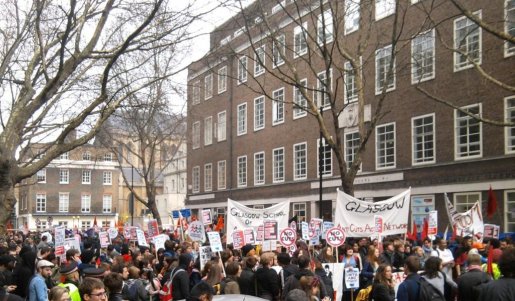 |
| nus.org.uk |
Under S.11, the police had every right to arrest Chessum on the grounds that he had failed to give prior notice of the demonstration, held to counter management's continuing plan of dismantling the largest students' union in Europe, opting instead to outsource services and dilute both accessibility and public accountability for its students.
Yet the claim rests on shaky grounds, for several reasons. First, as reported by the London Review of Books, Chessum was arrested almost immediately after his meeting with a member of senior management, who had previously written to him advising: ‘review your personal and institutional responsibilities and liabilities in leading protesters into physical danger and unlawful action'. While the University of London claim they have nothing to do with the protest, complains from union staffers suggest that the correspondence might amount to a clear threat taken in this context.
There's a bigger issue at hand, however; an ongoing trend in which authorities have actively clamped down on student dissidence in campuses across the country- and have gotten away with it.
Consider that even after the 2010 student protests in London, the metropolitan police continue to taunt students with letters 'reminding' them not to engage in 'disruptive, anti-social behaviour as Farah-Al-Nahda reports. The crackdown hasn't just been limited to mass protests either. Just a few months ago, another student at the University of London was arrested for a 'chalk protest' highlighting the University's aims at altering levels of pay to outsourced low-wage cleaners.
That isn't all, of course. On the same day that Chessum was arrested, secret footage published by The Guardian showed that the police were attempting to bribe students at Cambridge University into spying on activists on the campus. According to the tapes, the police weren't just searching for activists who may pose a risk to national security, but rather 'union-stuff', as "the things they discuss can have an impact on community issues."
While Chessum has now been released from Holborn police station, he, as have the rest of union members, has been banned from staging any more protests on any of the London campuses until further notice. Meanwhile, the University of London will continue the plans to disband ULU, only this time with little threat of resistance.
Finally- it's worth reading this piece on OpenDemocracy.net. It's an interesting article on the uses and abuses of security services in our universities, and the ways in which other forms of protests- including those against arms manufacturers, are also being trodden on.
What this says about how universities are changing is debatable, though the way I see it, arbitrary arrests, gagging orders and the increased erosion of transparency make it clear that public institutions are becoming more corporate, less accountable to their student bodies and disturbingly, more welcome on campuses.
Finally- it's worth reading this piece on OpenDemocracy.net. It's an interesting article on the uses and abuses of security services in our universities, and the ways in which other forms of protests- including those against arms manufacturers, are also being trodden on.
What this says about how universities are changing is debatable, though the way I see it, arbitrary arrests, gagging orders and the increased erosion of transparency make it clear that public institutions are becoming more corporate, less accountable to their student bodies and disturbingly, more welcome on campuses.
No comments:
Post a Comment